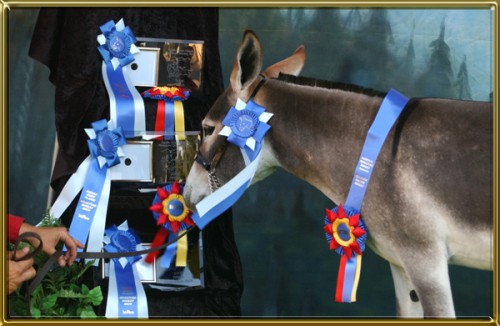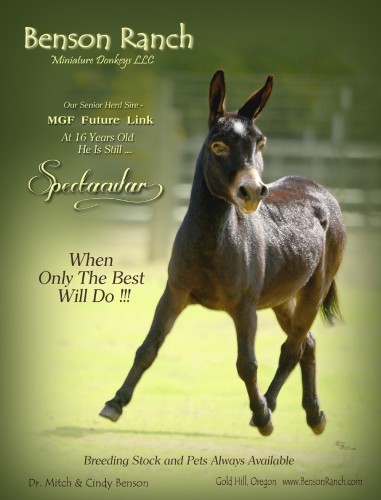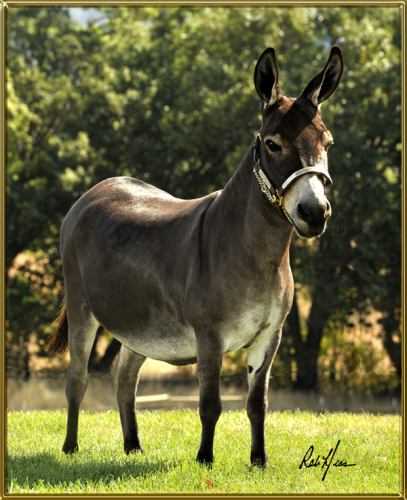written by Cindy Benson
2009
First of all let me say that I have Miniature Donkeys in my life because they make me happy. They make my heart soar and are purely a love affair. They have been for seventeen years so far and counting. I consider living with them a privilege and cannot imagine ever being without them. I don’t have them for the money I may make with them but I also think it is possible for them to pay for themselves which is where the business side of things comes in. Miniature Donkeys are not the next great get rich scheme but with the right pieces in place and diligence they can do this and even more. I don’t consider my love affair and business plans to be mutually exclusive. I have been asked to explain this side of things so many times over the years that I finally decided to write it all down. Please remember that what I will present here is what has been true for me. The donkey industry is varied across the country and adjustments must be made accordingly to create a plan that will work for you.
At this time last year the economy was scary and I worried that I would be selling french fries at Mc Donalds to handle the overhead a herd of 100+ represents but that has not been the case. I have a wonderful donkey mentor and I hear her words in my head often. One of her maxims is “Quality Sells” and that has been true here as 2009 has been my best year ever with regard to sales. I think the pet donkey market has been the hardest hit because those donkeys are often part of a family with less elective cash but I have had consistent steady interest in my breeding quality donkeys. Granted, I have adjusted my prices to fit the current market but my bills are paid and I have not had to part with my core breeding donkeys to make that happen. At one point my husband said that the donkeys might starve but we wouldn’t! Not a pretty picture!
And now to the nuts and bolts of it. The first and most critical issue is the quality of your herd. The next is the money, energy, and time required in effective marketing. Why should I buy from you? What’s so special? There are so many aspects of the donkey business that I love and one of my favorites is the marketing because it is such a cerebral and creative effort. All the quality in the world represented in your herd doesn’t do you much good in terms of sales if folks don’t know who you are and how to find you. If you feel your donkeys are special you must represent them as such, and buyers need to know you have them. In this day and age a web site is critical in my opinion. I get unbelievable traffic on my web site and it tells a lot of the story about the Benson/Cooke herd all by itself. Most of the interested donkey contacts generated by my web site are educated about my herd and are enthusiastic at the outset. I love it. Advertising costs money. Spend it! I have invested thousands in professional photos of my donkeys and the obvious beauty of those donkeys is often why people come back to my site repeatedly. Print advertising is equally important, and is appropriate way before you actually have anything to sell. People like to buy from who they know and name recognition is key. They also like to buy from a breeder who’s ethical principles and husbandry skills meet their scrutiny.
Lets talk about quality and why it matters. The money spent on your breeding donkeys is only very first part of your story. Buying donkeys of high quality with recognized and respected, predictable bloodlines is the key to your success. This is one of the things that separates the wheat from the chaff and sets you apart. It makes perfect sense to me. It is very common for interested donkey shoppers that come here to fall in love with donkeys they consider beyond their means. They tell me they will need to “breed for quality” rather than start with it. The flaw in that is simple math. A lesser jennet can be found for $1000-$2500 easily and she is likely to produce foals of that price range as well. It costs me approximately $400 annually per donkey for feed, farrier, and vaccination costs. Say you buy the $1000 jennet and breed her, and she is pregnant for the required year. You have spent $1400 (purchase price plus up keep). Now you have a six month old foal to sell; your cost is up to $1600. That foal is likely to be worth about what you paid for the jennet. This just does not make economic sense to me. I would much rather purchase a $4000-$6000 jennet, or more, because for the same annual financial commitment I have a much larger profit margin from that jennet. If she has a gelding quality foal this is not true in the same time frame but in the long run she is still the better investment. I like to look at how much time I think it will take a jack or jennet to recoup their initial cost and move to profit. What makes sense to you? What if you keep the jennet foal produced by your $1000 original jennet? You could easily have $2000 invested in her before she produces something to sell and unless she has done a remarkable job quality wise you aren’t selling her foals for much either. Your high quality jennet will reimburse you much more quickly and head on to profit, all things being equal.
One of the differences between a “hobbyist” and a “breeder” is having a breeding program. I believe that to be successful with donkeys as a business you need to be the latter. It’s easy to just add to the donkey population and a hobbyist is a person who does that in haphazard fashion. A “breeder” has a goal in terms of the characteristics he/she thinks are important in a donkey and a commitment to their contribution to the Miniature Donkey gene pool. I want to leave a legacy of quality. When I tour farms to learn about other breeders and bloodlines that I might like to add to my program I look for a herd of consistent quality and type. That tells me this breeder knows a little about conformation and that the donkeys he/she is offering come from a consistent background. After all, if I am buying breeding stock because I like what I see I would hope to produce more of the same when I bring this donkey home. The mark of a good quality breeding animal is in what it can produce; not what this individual donkey looks like.
Why would you want to buy a young donkey knowing you have to wait for it to mature? It is easy to find middle of the road, mature, pregnant jennets for sale that can produce income in the first year but much more difficult to find a really good one. Timing is everything and you might, especially as your name becomes recognized and respected, find a good one but I almost never sell a high quality mature jennet and if I do I am likely to offer her privately. She is unlikely to be available off of my web site. Selling a jennet of this quality doesn’t make financial sense most of the time. If I own a $6000 mature jennet she may bring in $2000-$6000+ per year for 20 years+. I would have to ask a huge price for her to make it worthwhile for me. For many years I have had a waiting list for my foals, especially from specific jacks or jennets, and that is a good position to be in! The difference is quality and marketing.
One more issue I consider critical to success in a business is ethics. As I see it, when I sell a donkey, be it pet or breeding stock, it is the beginning of my relationship with that buyer. I keep track of my buyers as they need me to and endlessly answer their questions along the way. It is hugely important to me that my buyers are happy with their purchases; for them, for me, and for my donkeys. If the donkeys aren’t right for that buyer I want to know about it and assist in finding them a new home. I guarantee my breeding donkeys to be just that and if at maturity a fertility problem should exist I will make the appropriate financial adjustment. Representing your breeding stock honestly and standing by them is the right thing to do for many reasons, and one of them is that it makes you the person to trust and buy from!
To wrap it all up my business plan needs to consist of unusually high quality breeding stock, a breeding program with specific goals, good husbandry practices, an effective marketing strategy, and LOTS of my time and effort. To do justice to the quality of life I want for my donkeys, especially given that I have so many of them, I start my day early and often am not back in the house until after dark. My husband calls it the “Cooke Livestock weight loss program” because I am very physical and burn a few calories. I love what I do and wouldn’t change a thing. I am proud of Benson Ranch! I hope I have answered some questions with this lengthy article. I always have time to answer more questions on “donkeys as I see it” so feel free to e-mail or phone! Above all I hope your donkeys bring you as much joy as I have had with mine.


